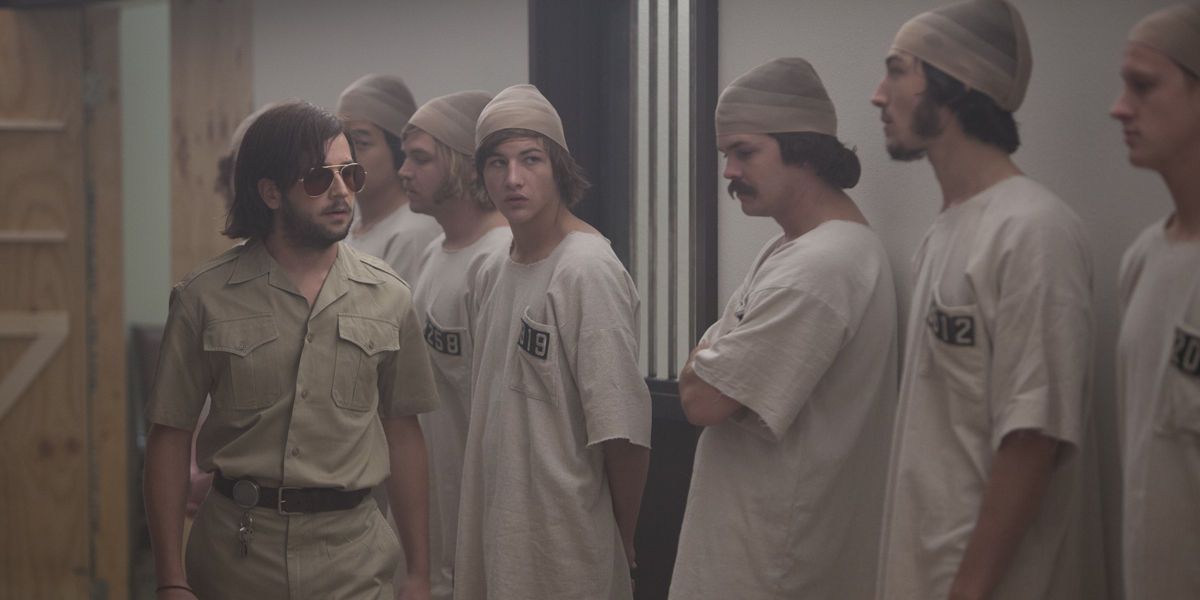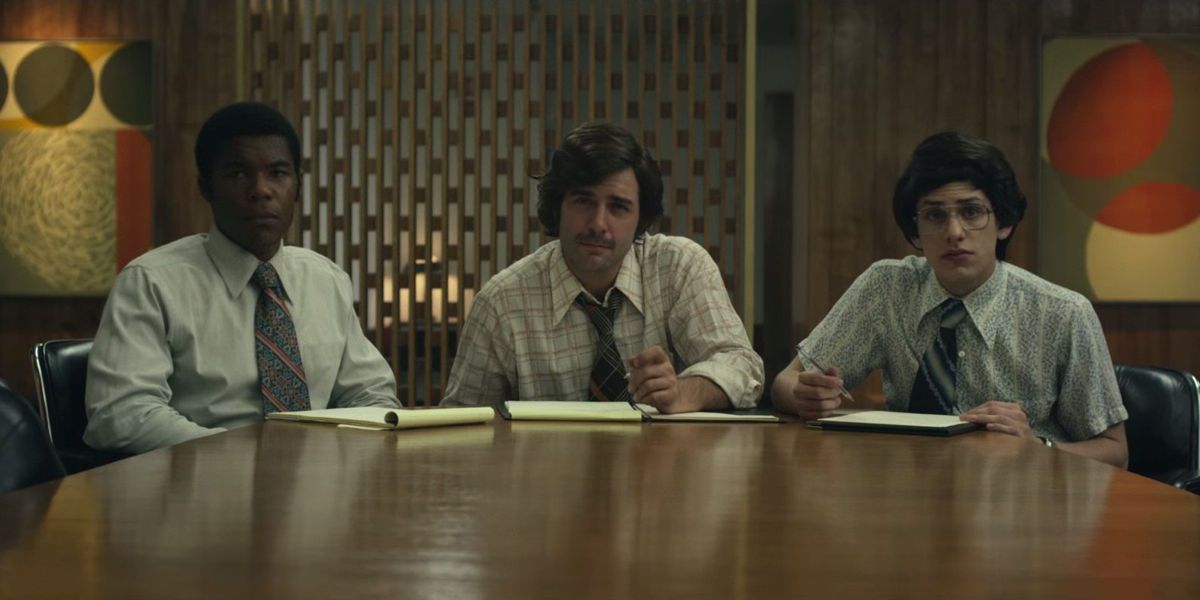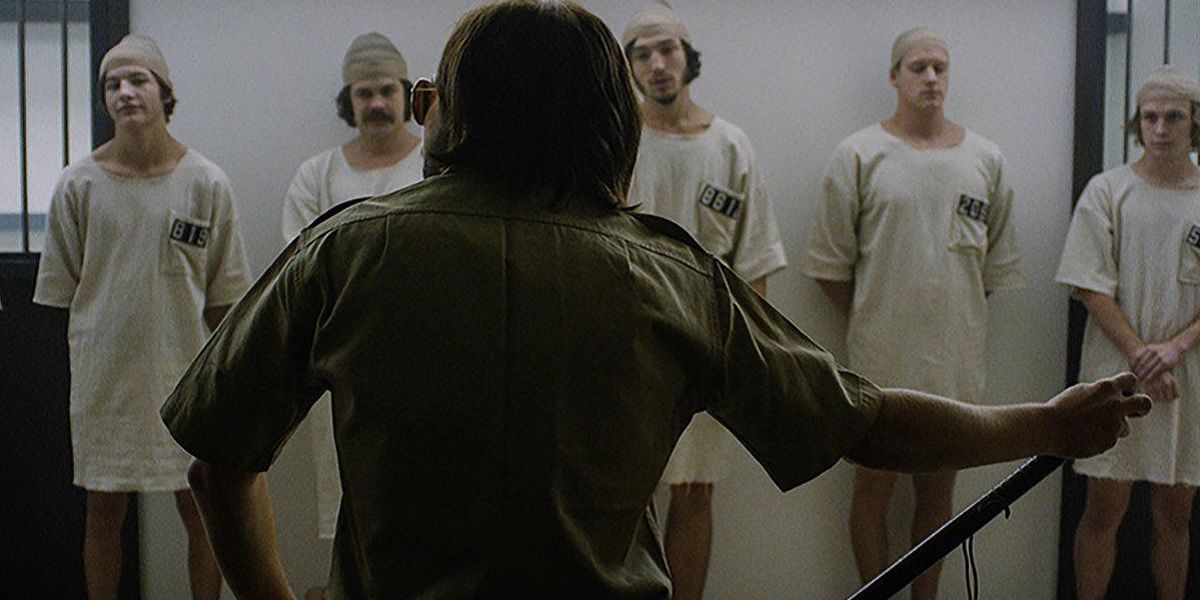In the midst of this crowded summer blockbuster season chock-full of popcorn fare comes a little Indie that could, built around challenging ideas about human behavior, power struggles and featuring a noteworthy ensemble cast (Ezra Miller, Michael Angarano, Johnny Simmons, Tye Sheridan, Nicholas Braun). That film is The Stanford Prison Experiment. Based on the famed 1971 event that you may or may not remember from your Psych 101 class, the film revolves around what happened when Dr. Philip Zombardo (Billy Crudup) attempted to study the psychological effects of imprisonment via a prison simulation set on the Stanford campus, during which 24 student applicants were randomly assigned to be guards or prisoners. The experiment ended abruptly after 14 days, the fallout from which continues to be discussed in psychology circles.
The events that played out during the real-life experiment offer an unnerving look at human nature. Screen Rant recently spoke with director Kyle Patrick Alvarez (Easier with Practice, C.O.G) to find out why the story spoke to him, how he managed to shoot a 130-page script in 21 days and if any of his Prison cast will be in his next movie, the YA-based thriller Acceleration.
The Stanford Prison Experiment is an amazing experiment about human nature, but seeing it on screen is hard to watch, what about it speaks to you as a storyteller?
For me when I read the script, it was sort of a three-fold thing. In many cases when you start with the story it's the story that draws you in and that was what was there for me. I was really fascinated by the more universal attributes of the experiment, that you could make a film that wasn't adapted, that wasn't saying to you, "Oh this is what the Stanford Experiment was about," or "This is what it meant," here we are 40-something years later still arguing about what it's validity was, or what it was really saying. For me I wanted to make a movie that existed in that conversation, but hopefully in 40 years could still play a part in that. As a director I was also drawn to, I love casting, to me I feel that I make them so that I can work with actors and you read something like this and you think, "Oh, I'm never going to have this opportunity in the Indie world to make this big of an ensemble film," it just doesn't happen. That was really exciting to me and also the challenges of, once we started looking at photos from the experiment, when we started to film it, I thought, so this really was just in a basement of a school, in kind of a crappy corner little hallway and teacher's offices, I thought, "How are we going to shoot that? How are we going to make a two hour film that barely ever leaves this hallway?" That was a really exciting challenge.
In casting, A+ awards for other people who you got involved?
[Laughs.] Well it was the reason I wanted to do the film, so I'm glad you like it. My very first meeting on the film, I was like, "If you don't have is Ezra Miller in this movie, we're making a mistake. We can't make this movie without him." There's something about Ezra, the way he carries himself, the way he is as a performer, he really genuinely feels like he's someone from a different era. For me, he has a larger than life quality that is rare in actors.
Also, we couldn't afford to bring in people from overseas, we couldn't afford the visas, and there's such a wealth of talented people in this age range, it really was exciting to have a combination of kind of more known people and people you might recognize, and then some people who aren't totally fresh faces, people who are from TV, or kids who had only done Nickelodeon shows before.
In reading about your insane turnaround in production schedule, how did you do that?
It was honestly one of the toughest shoots I've ever been on and will hopefully ever be on. It was about moving really fast because we needed coverage. When you have 12 people in a scene, it doesn't matter how small the room is, you have to set up 12 different times, so every day was its own little battle. I would finish each day and, as a dream as a director, you want to look back as you finish each day and say, "We got everything we needed," I think that's like the David Mamet principal or maybe I read it in a book, that your only real job as a director is to say when you're ready to move on. In this case, I had to move with this brazen confidence because we had to move on, there is no choice. I certainly went home everyday nervous, and really put my editor hat on, because I also cut the film. I really tried to think as an editor when we had to move so quickly. I can go back and look at the film and know where we had to make those quick changes and sacrifices to make it work.
I hope you go back and do that for the DVD or Blu-ray commentary?
You know what? I love audio commentaries, to me audio commentaries, I went to film school, but audio commentary is was my film school you know? On my last film they said "Honestly we don't sell more or less if we have an audio commentary. You can pay for your own studio space to record one, but we're not going to." I was so bummed out by that. I think it comes down to the fact that Netflix and iTunes, iTunes has iTunes extra but they're really not interested in the supplemental materials because I think the market has kind of got away from it. I kind of lament not being able to do those things because they were so important for me. I would love to be able to do that.
I'm lucky in that I get to talk to people like you about their experiences making the film, but I think it's great as an audience member to also hear a filmmaker talk about the process. Maybe there is a market for a network to make a show of audio commentaries, we should look into that.
[Laughs] Exactly, or how they do RiffTrax, or some kind of podcast version. That would be a good idea somebody doing a podcast that runs the length of a movie and you just start the podcast at the same time, so it's more of a conversation about the movie.
This is a great idea, let's you and I meet again to patent this. Going back to the crazy production schedule and your huge ensemble, I know it's dark subject material so you can't be joking around but were there light moments on set?
Actually, it was a really light set for the actors in a way. I tried really hard to have it not be as intense as set as the material was, I'm totally supportive of actors. If an actor wants to be Method or stay in character, I'm fine with that. On this film, with so many people in every scene, I told everyone that we're all going to have to work together, these scenes are about everyone, no single person is a star, so in turn because a lot of these guys have worked together before, it created a pretty casual set for the actors. We were shooting our intense day, I think we did like 98 set-ups or something, we couldn't even believe that we were shooting all that stuff at the end of the film, where we were in really intense close-ups in really in people's faces, it was so great, it was just about the work. There wasn't a lot of lighting and stuff, because we were so close in on everyone, and the actors were just ready to get through it all, there were a couple of times we actually got ahead of schedule because everyone was on their A-game. Everyone was working really hard and it was all about the performances. That was probably my favorite production day I've ever had. Because it felt really pure, it felt like, we were laughing at the situations, but especially when you're doing the camera-humping stuff at the end, you've got to have some levity there. If not, it's just going to be too tough for everybody. There was this great vibe that when the camera was rolling, it was really intense, but when we turned the camera off, people joked around. Michael Angarano, he kept the accent up and that sort of just became a fun thing. I never got tired of his accent.
I know you have to go soon, but after this crazy production schedule, What's your rainbowland next dream project?
I'm trying to work off the idea that my next dream project is just whatever I love. I really admire the filmmakers who do really wildly different things all the time, and not just deliberately so. You look at Ang Lee, each of his films has its own language yet they all seem like they come from him to some degree. So, I'm really fascinated by that, Linklater to a great degree does that, Soderbergh too. But the idea that, I guess it's an anti-auteur theory in a way, that I would adjust to the movie. In this movie, there's a lot more deliberate camera work and that was really fun to do, so I would like to - I'm attached to do this thriller that is like a fun teen suspense thriller that all takes place in the subways of New York. That's really exciting to me because it's the first thing I've done that's 100% fiction and it would just be about trying to create an interesting suspense type of movie, but then I would love to go to do something small again or a character study, I guess that's a bit of a non-answer, I guess I just try to trust my gut.
Your choices so far have been very unique and interesting so whatever is guiding you keep going with that and I hope you use some of the gents in this movie for your thriller.
Oh god, I would love to. I've never really been able to work with an actor twice yet, the projects have been to different or timing doesn't work out, but I would love too, I love all these guys. I would work with all of them again in a heartbeat.
-
The Stanford Prison Experiment is now playing in theaters



